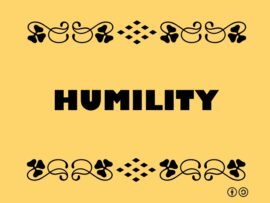Let me begin with a confession. Putting together this article has been a truly humbling experience. You see, I decided to research the concept of humility online and was shocked at how little I knew about how this trait is perceived in the popular culture.
Here is just a sample of what I discovered about some of the widely accepted perceptions of being humble:
- Being awesome at something and then telling people you are not awesome at it. Interesting… isn’t that the definition of lying?
- Not recognizing your own achievements, despite how good they are.
Even more interesting – isn’t that the definition of low self-esteem?
3) Humility is from the root word “futility,” knowing when you are wrong.
Not!
4) Remaining teachable; knowing that you do not have all the answers.
OK, sounds a bit more on the mark.
I always find it fascinating to compare contemporary society’s understanding and definitions of different concepts with the definition provided by our eternal Torah. In this week's Torah portion, Vayikra, The portion begins with the Almighty calling out to Moshe and instructing him to teach the laws of sacrifices to the Jewish nation. Rashi explains that the word “vayikra” (“and he called out”) denotes a very intimate communication. Moshe merited almost a personal dialogue with the Almighty.
Interestingly, the last letter of the word “vayikra,” an aleph, is written smaller than the other letters in the Torah scroll, almost as if there were a font malfunction. Without the letter aleph, “vayikra” reads instead as”vayakar,” loosely translated as “and he encounters by chance.” The Midrash that says the small aleph was modified by Moshe, who was uncomfortable with the word “vayikra,” an expression that publicly proclaimed his exceptionally close connection to the Almighty. He therefore downplayed his relationship with the Almighty by minimizing the aleph, as if to say, “Please read it without the aleph and realize that I am not as special as you may think.”
On one hand, Moshe was fully aware of his own level of greatness, as we say in our prayers, "In Israel none will arise like Moshe," yet he was careful not to flaunt it to the world. From this we can derive that, the Torah definition of humility is being aware of your greatness, but keeping it to yourself.

